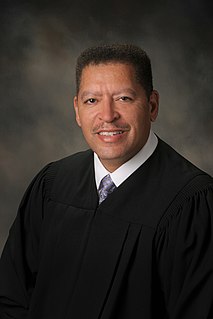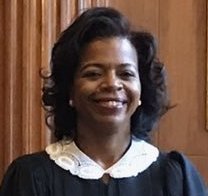Related Research Articles
Mark D. Martin was the Chief Justice of the Supreme Court of North Carolina from 2014 through 2019. He was appointed by North Carolina Governor Pat McCrory to become Chief Justice on September 1, 2014 upon the retirement of Sarah Parker. Martin was already running for the seat in the 2014 general election.

Griffin Boyette Bell was the 72nd Attorney General of the United States, having served under President Jimmy Carter. Previously, he was a U.S. Circuit Judge of the United States Court of Appeals for the Fifth Circuit.

James Andrew Wynn Jr. is an American jurist. He serves as a United States Circuit Judge of the United States Court of Appeals for the Fourth Circuit and formerly served on both the North Carolina Court of Appeals and the North Carolina Supreme Court.
John Marsh Tyson is an American jurist and government official, who currently serves as a Judge of the North Carolina Court of Appeals. He also previously served on the court from 2001 to 2009.

David Bryan Sentelle is a Senior United States Circuit Judge of the United States Court of Appeals for the District of Columbia Circuit.

Richard Allen Griffin is a United States Circuit Judge of the United States Court of Appeals for the Sixth Circuit. Previously, he was a judge on the Michigan Court of Appeals.

Terrence William Boyle is a United States District Judge of the United States District Court for the Eastern District of North Carolina. He was Chief Judge of that court from 1997 to 2004. He served a second term as Chief Judge from 2018 to 2021. From 1991 to 1993 and again from 2001 to 2007, he was a nominee to the United States Court of Appeals for the Fourth Circuit. His federal appellate nomination from 2001 to 2007 is the longest in history not to be acted upon by the United States Senate.

Cheri Lynn Beasley is an American attorney and jurist who served as the chief justice of the North Carolina Supreme Court from 2019 to 2020. Beasley had previously served on the North Carolina Court of Appeals and as a district court judge in Cumberland County, North Carolina.

One justice of the North Carolina Supreme Court and five judges of the North Carolina Court of Appeals were elected by North Carolina voters on November 2, 2010, on the same day as the U.S. Senate election, U.S. House elections, and other state-level elections. North Carolina judicial elections are non-partisan. Terms for seats on each court are eight years. All incumbent judges and justices who sought re-election won their respective races, except for Judge Cressie Thigpen of the Court of Appeals, who had been appointed shortly before the election and lost North Carolina's first statewide election to use Instant-runoff voting.
Albert Diaz is a United States Circuit Judge of the United States Court of Appeals for the Fourth Circuit. Diaz is the first Hispanic judge to serve on the Fourth Circuit. Prior to his appointment to the Court of Appeals, Diaz was a North Carolina state superior court judge and an appellate judge for the Navy-Marine Corps Court of Criminal Appeals.
Cressie H. Thigpen, Jr. is a North Carolina lawyer and jurist who served on the North Carolina Court of Appeals.

Joseph Robert John, Sr. is a member of the North Carolina House of Representatives, serving since 2017. He is a former judge of the North Carolina Court of Appeals. He served on that court from 1992 until 2000. Previously, he had been a state superior court and state district court judge, based in Greensboro. He had also been a prosecutor and practiced at the firm of Pell, Pell, Weston & John.

One justice of the North Carolina Supreme Court and three judges of the North Carolina Court of Appeals were elected by North Carolina voters on November 6, 2012, concurrently with the elections for Governor and other offices. North Carolina judicial elections are non-partisan. Terms for seats on each court are eight years. In three of the four races, incumbents were re-elected to their seats, but incumbent Court of Appeals Judge Cressie Thigpen was defeated by Chris Dillon.
Christopher "Chris" Brook is an American lawyer and jurist. Judge Chris Brook spent his formative years in Raleigh, attending Daniels Middle School and Broughton High School. He received his undergraduate and Juris Doctor (J.D.) degrees from the University of North Carolina at Chapel Hill. At Carolina Law, he was managing editor of the North Carolina Journal of International Law and Commercial Regulation and director of the school's Pro Bono Program. From 2007 to 2011, Judge Brook served as an adjunct professor at Carolina Law.
Mark Allen Davis is an American attorney and jurist. He has served as an Associate Justice of the North Carolina Supreme Court (2019-2020) and previously as a Judge of the North Carolina Court of Appeals.

Four justices of the seven-member North Carolina Supreme Court and four judges of the 15-member North Carolina Court of Appeals were elected by North Carolina voters on November 4, 2014, concurrently with other state elections. Terms for seats on each court are eight years.

One justice of the seven-member North Carolina Supreme Court and five judges of the 15-member North Carolina Court of Appeals were elected by North Carolina voters on November 8, 2016, concurrently with other state elections. Terms for seats on each court are eight years.

One justice of the seven-member North Carolina Supreme Court and three judges of the 15-member North Carolina Court of Appeals were elected by North Carolina voters on November 6, 2018, concurrently with other state elections. Terms for seats on each court are eight years. These elections were partisan for the first time since the elections of 2002. A law passed by the North Carolina General Assembly in 2017 cancelled primary elections for judicial elections in 2018 only, meaning that an unlimited number of candidates from any party could run in the general election.

Three justices of the seven-member North Carolina Supreme Court and five judges of the 15-member North Carolina Court of Appeals were elected by North Carolina voters on November 3, 2020, concurrently with other state elections. Terms for seats on each court are eight years. These elections were conducted on a partisan basis.

Two justices of the seven-member North Carolina Supreme Court and four judges of the fifteen-member North Carolina Court of Appeals will be elected by North Carolina voters on November 8, 2022, concurrently with other state elections. Terms for seats on each court are eight years. These elections will be conducted on a partisan basis.